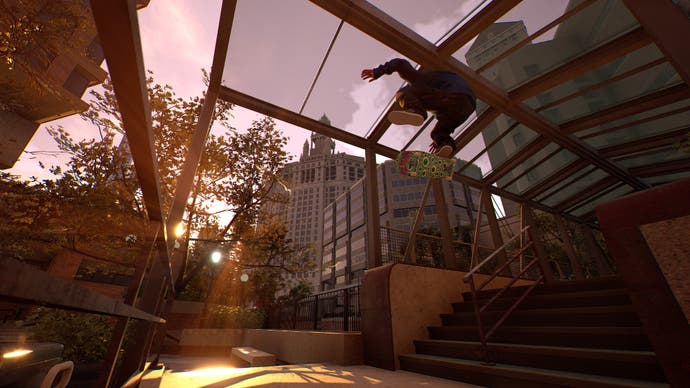Session: Skate Sim review - a deeply rewarding simulator in need of a little flair
Grind.
Skateboarding is hard. Really damn hard. The journey to mastery is one counted in years - or even decades.
Landing a kickflip while moving along? Sure, today there are wildly more complex tricks out there, but it's still a tremendous achievement. It takes hours of investment and a deep resilience to failure to get there. But the moment you pop the board high, flick it with a foot just enough to spin once beneath you, and successfully commit to the landing, the reward is immense. It's not an achievement recompensed in any kind of currency like score. Rather, to succeed is more than enough of a payoff.
That is the mindset that has clearly founded the design of Session: Skate Sim. Certainly, it is not as hard as real skateboarding, but this is a game that is profoundly challenging, and one that makes you think like a skateboarder. The clue is in the name. Developer creā-ture Studios has strived to deliver a skateboarding simulator. In doing so, they've built something that does a remarkable job of capturing the essence of real skating; even if that approach sometimes comes at the expense of what makes for a consistently enjoyable video game. To deconstruct what that means, the conversation inevitably starts with an iconic series.
For many years, the Tony Hawk games triumphed in abstracting skateboarding tricks out to various series of button combos, letting players string together impossible trick lines that could pass through a whole level. The skill ceiling Hawk's games offered certainly loomed high, but almost anyone could leap in and quickly skate like a pro, prodding merrily at all manner of buttons. Then, in 2007, EA Black Box debuted the beloved Skate, which at least alluded to simulation. Its innovative thumbstick-based control system inspired by the subtle foot movements of real skateboarding meant it felt much more directly informed by the sport that inspired it.
So many years on, creā-ture Studios has taken Skate's lead and run with it, delivering something so committedly in simulator territory that it could be considered a genre-mate with Train Sim World as much as with the Tony Hawk games. As such, like real skateboarding, it is a hard, frustrating, and deeply rewarding experience. While the likes of the sublime OlliOlli games - with their emphasis on timing the landing of tricks - expertly translated the spirit of skateboarding into a playful video game form, Session is unashamedly devoted to realism. In its own peculiar, imperfect way, it captures more about skateboarding than any other game that came before it.
What will be familiar to those that have spent time with the Tony Hawk or Skate games is the setting; a vast urban expanse explored in three dimensions, littered with street furniture perfect for grinds and flip tricks. And yet this is a game with no score system, no hidden collectibles, and very few opportunities for stunt skating. Frills are few and far between here. You won't even get a trick name displayed when you successfully land it. The motivation to play is to explore skateboarding, and the reward is landing tricks, often after a considerable investment of time. In your first hour, you should start to hit kickflips on the flat. Many more hours in, just timing a 360 flip to clear a curb and land on a concrete planter can still go wrong in all manner of ways.
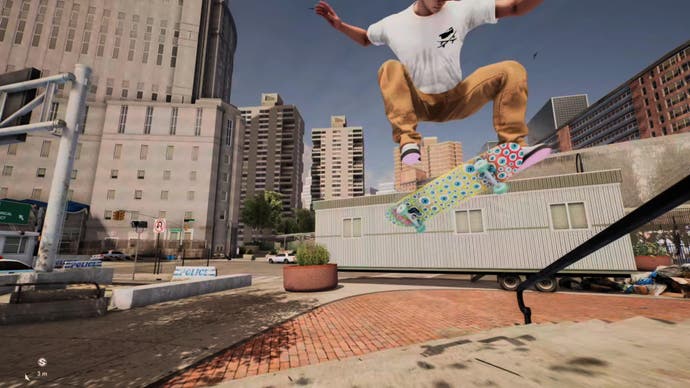
Session's unique play feel is delivered via a combination of its physics system and the controls. Depending on your stance, one thumbstick represents the front foot, and the other the back foot. If you're firmly standing on the board, pushing in a particular direction sets where you place the weight of each foot. Pull back with your back foot and - as with real skating - you put all the weight there, coiled like a spring and bristling with the potential of kinetic energy. Thrust the other foot forward, and an ollie begins. Building on that, different movements, motions and foot placements can trigger everything from a humble pop shuv to a monstrous nollie pressure hardflip 360.
Want to manual out of a trick? Shift your weight appropriately over the deck. Need to powerslide to a stop? Push each foot out to the nose and tail of your deck, and the board responds accordingly. It would be an overstatement to say that every thumbstick movement absolutely mirrors real skateboarding's method of control, but it comes closer than any other game has managed.
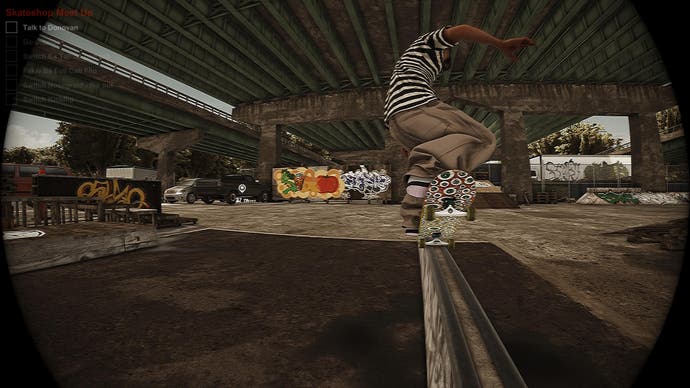
Then there's the way the game world's physics shape what is possible. When it comes to grinds, the standard in skateboarding games is that, to a greater or lesser extent, on leaping above a grindable object, the board 'snaps' to the rail or edge. Not so in Session, where there is no discernable help there. You'll need to approach an obstacle at just the right angle and speed, pop a trick with meticulous timing, and then land with the weight of your feet as they should be for various grinds. Connect with a rail off centre by a fraction on just one truck, and the grind will most likely fall apart - or you might unearth a new trick or approach.
Dive into the game's many settings - including some 'experimental' options that bring lashings of beta energy - and you can really start to push what is possible with a board, and further explore a control system with enormous breadth for discovering new things.
Even with default settings, discovery defines the journey. Session's narrative is minimal, but it might be a spoiler to explain how to do a triple flip, for example. It truly is wonderful to be freed from the likes of a predetermined list of tricks, each assigned an abstract chain of button presses. Real skateboarding is about exploring, and seeing urban terrain redefined through a playful new lens. Session gets a lot right in translating that experience. It gives you a skateboard, gravity, control over your feet, swathes of concrete and rails, and lets you decide what might be possible with that combination.
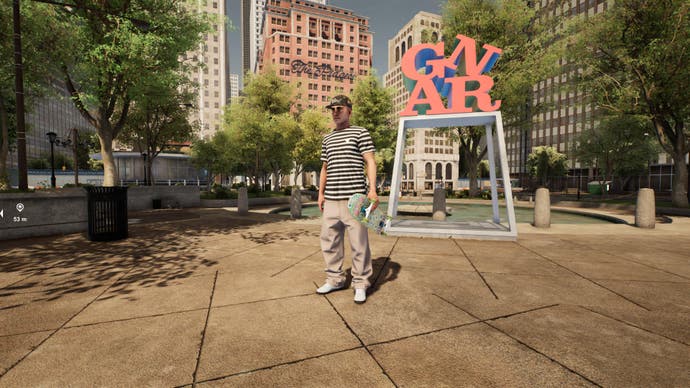
And yet creā-ture Studios' creation is also a very peculiar beast when it comes to how the entire experience is framed. Visually, on the PS5 it is functional rather than striking or exciting. There are some nuanced touches, such as how your wheels, griptape and even clothing pick up grime and wear. But so much of the presentation is without flourish.
Even if you switch on the likes of pedestrians in the settings, its city landscapes are tonally dead; often uncanny in their eerie emptiness. Meanwhile, the cast of other unvoiced skaters you do meet feel rather too hollow. Even your own character lacks any kind of presence, turning into a floppy ragdoll any time you come off the board - which happens a lot.
Session also makes some unusual choices in how it communicates the game to you. A chain of missions take you through the game, introducing techniques and nudging you to new areas. While you can dig current goals out of the pause menu, the text that delivers the details of the missions can't be revisited, and becomes increasingly rich in skateboarding jargon. So if you miss text, or are not fluent in the parlance of skating, too often you find yourself at a bit of a loss with how to progress. Elsewhere, it's easy to miss that you can teleport between multiple cities, and the map is barebones at best.
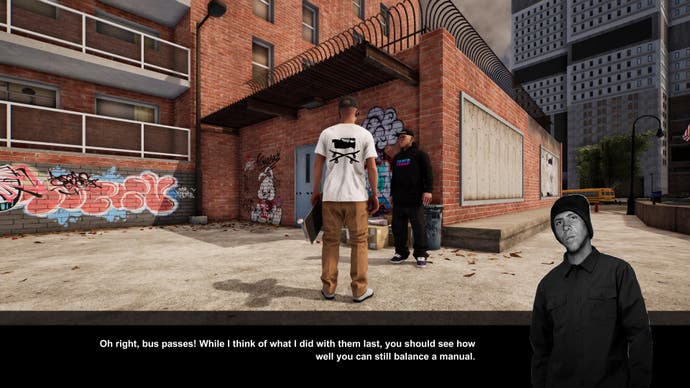
Again, here the comparison with recent years' wave of sombre train and trucking simulators bears up. This is a game about realism over atmosphere or any attempt at vibrancy. There are concessions to tone. A pumping soundtrack offers a refreshing emphasis on genres like dancehall and ragga, and there are opportunities to customise your clothing and board. But don't expect to plunge into the skateboarding lifestyle, or much in the way colourful.
Unashamedly, Session is a game about function, and capturing what it is to skate; not so much the surrounding culture the sport has passed on to the mainstream. Like real skateboarding, it rewards persistence. It is a solitary pursuit that can feel demanding and flat at times, but that is very hard to put down.
Session is also something wonderful. When it all clicks, it doesn't get much easier, but when you finally nail something as relatively simple as a kickflip to tailslide, you feel like the world's most accomplished gamer. For those of us that skate, Session brings something magical, even if it has plenty of strange flaws. If you haven't touched a deck since the one you got in a toyshop as a kid, and don't mind a challenge that knocks on the door of what bullet hell shmups offer, it is truly fascinating, and can be deeply rewarding. Persistence pays off, in what might be the extreme sport genre's most distinct contribution yet.
